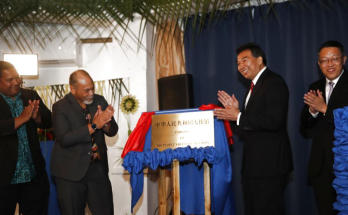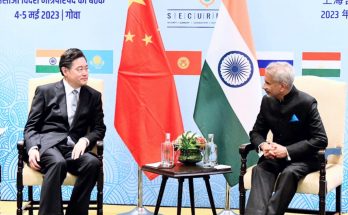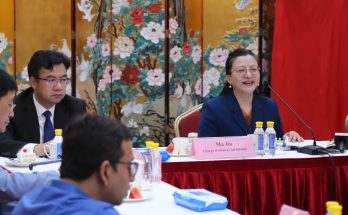
As you may recall, at the Inaugural meeting of 54th Annual Session of the Asian-African Legal Consultative Organization (AALCO) held in Beijing in spring of last year, Premier Li Keqiang of China announced that the Chinese government would set up a China-AALCO exchange and research programme on international law. This planted seeds for cooperation and exchanges.
One year on, with the joint efforts of various parties, this seed has taken root and sprouted, and relevant activities are being carried out.
You will learn from this exhibition that the programme, funded by the Chinese government and open to all AALCO member states, is aimed at promoting exchanges and experience sharing and strengthening capacity building in the field of international law, including a training and exchange platform for legal officers of member states and officers of the Secretariat, and funding for AALCO research, activities of its working groups and expert groups, and the participation of the Secretariat in other international organisations or conferences.
Last summer, the first training session was held on a pilot basis in Xiamen. In coming August and September, the second training session will be held in Beijing. Other activities are also being planned. I hope this photo exhibition will help you better understand the programme, and I welcome the active participation and support from all sides, so that together, we can learn from each other and make common progress.
Building consenus: Bandung spirit
This programme is a tribute of the Chinese government to the 60th anniversary of AALCO, and represents China’s high expectations and firm support for a bigger role of AALCO in the new era. Over the past 60 years, under the guidance of the Bandung Spirit of unity, friendship and cooperation, AALCO has been indispensable in promoting consultation and cooperation, building consensus, and upholding the common interests of Asian and African countries in the field of international law, and has made indelible contribution to the development of international rule of law.
The international order is now undergoing profound transformation. The current international system was created without the active participation and input of Asian and African countries. Now we have a historic opportunity to have a bigger collective influence on the evolution of the system. We may take AALCO’s 60th anniversary as a new starting point, strengthen unity and cooperation, improve our collective influence in the evolution of international law, and build a more equitable and reasonable international order that will better uphold world peace and promote development of Asian and African countries. China is ready to work together with other Asian and African countries towards this common goal.
This year marks the 70th anniversary of the International Court of Justice (ICJ), the principal judicial organ of the United Nations. In this context, I would like to share with you my observations on the peaceful settlement of disputes through the appropriate application of judicial procedures. The ICJ has done a good job in promoting the peaceful settlement of disputes. Its role has been valued and appreciated by many countries. However, some few international judicial bodies have caused great controversy, criticism and concern from various countries including Asian and African countries. This should give us much food for thought. It reminds us that the application of international judicial procedures should be based on full respect for the will of the countries concerned as well as their prior consent and in full consultation of the countries concerned. In the initiation of procedures for the interpretation and application of international treaties, it is important to act with good faith, equity, impartiality, objectivity and prudence, and to avoid any ultra vires or abuse. It is also important that dispute settlement procedures should work for the resolution of disputes, instead of provoking or escalating differences, still less infringing upon the rights and interests of other countries under the pretext of the rule of law.
International law and bilateral route

In this context, I would like to stress that, as a faithful supportor of international law, China is firmly committed to the peaceful settlement of disputes through negotiations, which is the primary means of dispute settlement in accordance with international law. This is also based on China’s understanding of international practice as well as its own rich national practices. Through friendly negotiations, and based on the principle of “one country, two systems”, China has properly handled issues concerning Hong Kong and Macao which had been left over from history, and thus added a China’s experience to the practices of peaceful settlement of disputes through negotiations. Through friendly negotiations, China has settled boundary questions with 12 of its 14 land neighbors and delimited around 20,000 kilometers of the boundary, accounting for 90% of China’s land border. China is now maintaining active negotiation with India and Bhutan respectively on the resolution of boundary issues. Through friendly negotiations, China and Vietnam have delimited their maritime boundary in the Beibu Gulf. China and Vietnam also have committed to solving other maritime delimitation issues through negotiations. China and the Republic of Korea launched their negotiation on maritime delimitation in December 2015. Resolving disputes through negotiations has already been a regional rule for Asian countries. In 2002, China and ASEAN countries signed the Declaration on the Conduct of Parties in the South China Sea, and according to article 4 of the Declaration, the Parties concerned undertake to resolve their territorial and jurisdictional disputes by peaceful means through friendly consultations and negotiations by sovereign states directly concerned. This is a common undertaking by China and ASEAN countries.
In accordance with international law, Asian experience and China’s practices, we believe that bilateral negotiations have been becoming effective approach to handling complicated and sensitive issues, as it fully respects the will of the countries concerned and sovereign equality between them. Moreover, the outcomes of negotiations are more acceptable to the people of those countries and can be implemented smoothly, and therefore more lasting.
(This is the edited version of the speech Liu Zhenmin, Vice Minister of Foreign Affairs of China, at the Photo Exhibition of The China-AALCO Exchange and Research Program On International Law)
Author Profile
- India Writes Network (www.indiawrites.org) is an emerging think tank and a media-publishing company focused on international affairs & the India Story. Centre for Global India Insights is the research arm of India Writes Network. To subscribe to India and the World, write to editor@indiawrites.org. A venture of TGII Media Private Limited, a leading media, publishing and consultancy company, IWN has carved a niche for balanced and exhaustive reporting and analysis of international affairs. Eminent personalities, politicians, diplomats, authors, strategy gurus and news-makers have contributed to India Writes Network, as also “India and the World,” a magazine focused on global affairs.
Latest entries
 DiplomacyApril 10, 2024Diplomat-author Lakshmi Puri pitches for women power at LSR
DiplomacyApril 10, 2024Diplomat-author Lakshmi Puri pitches for women power at LSR India and the WorldApril 6, 2024UN envoy pitches to take India’s solutions to the world stage
India and the WorldApril 6, 2024UN envoy pitches to take India’s solutions to the world stage CultureApril 5, 2024Youth in Diplomacy: Making it Matter with LSR Model UN 2024
CultureApril 5, 2024Youth in Diplomacy: Making it Matter with LSR Model UN 2024 India and the WorldMarch 28, 2024India to China: Normalization of troops deployment imperative for restoring ties
India and the WorldMarch 28, 2024India to China: Normalization of troops deployment imperative for restoring ties







